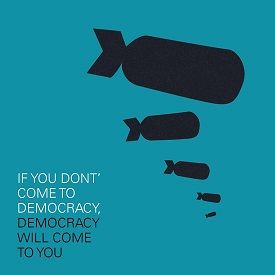Washington Post Really Thinks U.S. Should Be World’s Policeman
Jim Lobe

If you want to get some insight into how the Washington Post’s editorial board increasingly thinks of the world and the U.S. role in it, editorial page editor Fred Hiatt’s column in Monday’s newspaper provides a good idea. While Hiatt is generally not as ideological as his deputy, Jackson Diehl (although he did hire Jennifer Rubin), his basic belief in U.S. exceptionalism, his rejection of “retrenchment” and “limitations” (on U.S. power), and, above all, his implicit equation of international “engagement” with military intervention demonstrates how his version of liberal internationalism is so easily co-opted by neo-conservatives:
But the dominant impression among foreign officials [read Hiatt himself] is of a policy of retrenchment. They see a steady reduction in the size of U.S. armed forces that will mean less ability to intervene and influence. They watched Obama withdraw all troops from Iraq, failing to negotiate an agreement that would have preserved some U.S. role in that now-unraveling country. They see him preparing to withdraw most — or all, his spokesman has said; the size of any residual force has not been announced — troops from Afghanistan. [Emphasis added.]
Consider the logic of this passage. He seems to be saying (through his unnamed “foreign officials”) that U.S. influence in world affairs is directly correlated with the size of its military and the willingness of its commander-in-chief to use it to intervene in foreign countries. In this very Kaganesque view of the world, hard power is really the only power that really counts. The notion that military power must necessarily rest on a strong economic foundation — or even that “soft power” may also play an important role in gaining influence overseas — seems to him or his foreign officials to be secondary at best.
He goes on to cite the U.S. intervention in Libya as “a case study in the policy of limitations” to which Hiatt now strongly objects.
Obama acted only when pressed by French and British allies and then insisted on withdrawal instead of committing to help a new government establish itself. The predictable result is an unstable country, riven by militias and posing an increasing danger to its neighbors through the spread of arms.
And then, of course, he blames Obama’s failure to intervene decisively in Syria last year for “the degenerat[ion] [of the conflict] into something so savage that it’s no longer clear what, if anything, might help.”
The question these observations raise, of course, is what would Hiatt have Obama do? Does he seriously believe that the U.S., at this juncture in its history, has the resources to “nation-build” in Iraq, Afghanistan, Libya, and Syria (presumably Mali now, too) all at the same time? And, given what the U.S. has accomplished with the hundreds of billions of dollars it has devoted to “nation-building” in Afghanistan and Iraq, does he really think that Washington — and especially the Pentagon, which has disbursed the great majority of those funds — even knows how to go about “building nations?” Has he read the reports of the Special Inspector General for Iraq Reconstruction (SIGIR), and his counterpart in Afghanistan? His assumption, of course, is that U.S. intervention — especially military intervention — must automatically make things better for the natives, even if the evidence consistently suggests that the natives may hold a different opinion.
Admittedly, Hiatt does insert a qualification:
During the Cold War, too, Americans fought bitterly over the size of the defense budget, the wisdom of interventions and the morality of supporting unsavory but friendly dictators. Over the decades the country made terrible mistakes overseas. But U.S. engagement and influence also helped to gradually open the world to more democracy and more prosperity.
Again, we see in this passage the assumption that big defense budgets, military or covert interventions, and U.S. support for friendly dictators — as controversial and even mistaken as those policies might have been — have all somehow contributed to a better world, that all’s well that ends well. But I think many Vietnamese, Cambodians, Iranians, Central Americans (especially Guatemalans), Brazilians, Chileans, Congolese, Iraqis, Indonesians, and citizens of other countries who have been on the receiving end of the U.S. defense budget, military or covert intervention, and those unsavory dictators may take exception to that conclusion. Certainly even a cursory reading of Shibley Telhami’s new book, The World Through Arab Eyes, which summarizes more than two decades of his work on public opinion in the Arab world, should disabuse him of how U.S. interventions in that part of the world has been perceived by the people there.
On this subject, Steve Walt’s latest on the “Top Ten Warning Signs of ‘liberal imperialism’”, which offers some sage observations, also notes that:
[L]ike the neocons, liberal imperialists are eager proponents for using American hard power, even in situations where it might easily do more harm than good. The odd-bedfellow combination of their idealism with neocons’ ideology has given us a lot of bad foreign policy over the past decade, especially to intervene militarily in Iraq or nation-build in Afghanistan, and today’s drumbeat to do the same in Syria.
___________________________________________________________________________________
Jim Lobe is best known for his coverage of U.S. foreign policy, particularly the neo-conservative influence in the Bush administration. The Washington Bureau Chief of the international news agency Inter Press Service (IPS), Lobe has also written for Al Jazeera English, Foreign Policy In Focus, Alternet, Tompaine.com, and was featured in BBC and ABC television documentaries about motivations for the US invasion of Iraq. Read his complete biography here.
___________________________________________________________________________________
Article published here: LobeLog. Illustration: Enthropia
URL: http://www.a-w-i-p.com/index.php/2013/05/24/washington-post-really-thinks-u
























